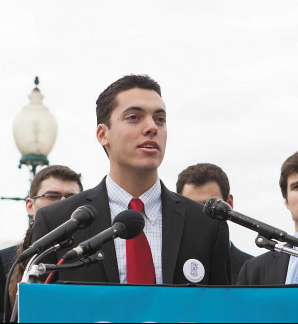
Nick Troiano (COL ’11, GRD ’13), at a 2013 rally for The Can Kicks Back, is exploring a congressional run for Pennsylvania’s 10th district
Nick Troiano (COL ’11, GRD ’13) is looking to join that group in 2014; though, at 24, he would stand out from his peers as Congress’ youngest representative. Troiano will become eligible to run upon his 25th birthday.
Troiano announced Feb. 18 that he is exploring an independent, citizen-funded campaign in Pennsylvania’s 10th district, which has been represented since 2010 by Rep. Tom Marino (R-Pa.), who is seeking re-election in 2014.
Should Troiano win, he would join the ranks of Rep. William C.C. Claiborne, a Democratic-Republican from Tennessee elected to Congress at the age of 22 in 1797 as one of the youngest congressmen in history. Rep. Patrick Murphy (D-Fla.), 30, is the current youngest member of Congress.
Troiano is a James Madison fellow with the Millenial Action Project, a nonprofit that supports young, bipartisan leaders in an effort to fight political gridlock. A former Republican, Troiano says on his campaign website that he decided to run for Congress as an independent after the government shutdown in October.
Troiano hopes to become an advocate for millennials from the halls of Congress.
“Our generation is drastically underrepresented,” Troiano told The Hoya. “Six percent of our Congress is under 40, and there are no 20-somethings serving. So I feel that not only is my potential candidacy important for a step toward political reform, but it’s also important to give some voice to a generation that doesn’t have one in politics.”
Jeffry Burnam, a visiting professor in the department of government who taught Troiano several times and a man whom Troiano named as one of his inspirations for entering politics, agreed that Congress needs more youth representation.
“The average age of a congressman is 60, which is grossly unrepresentative of the general population,” Burnam said. “I think there’s a thirst for new faces. I think that people are hungry for new ideas and now solutions; they’re tired of gridlock.”
While 2008 saw a record high 49 percent of voter turnout for the younger generation, Troiano stressed the importance of young people involving themselves in politics beyond the ballot.
“We may have voted in the most numbers ever — for example, in 2008 — but our Congress is steadily growing older and older every year, largely because the people who are there are staying there longer and longer,” Troiano said.
Troiano’s platform, which he described as “a post-partisan platform for generational equity,” centers on fiscal responsibility, economic mobility and environmental sustainability. Troiano hopes to establish an organization that would lend support to young people attempting to enter politics, inspired by EMILY’s List, a political action committee that supports pro-choice, Democratic women.
“I think we need a similar organization just focused on young people to give them the encouragement and the tools,” Troiano said. “I’d like to prove a model for how a young person can successfully run for office, and then maybe in 2016, recruit and support more young people doing the same thing.”
Before Troiano will officially declare his candidacy, he has set benchmarks for fundraising and support, including raising $25,000 in online contributions and getting 1,000 online signatures of support.
“To me, that’s not only a demonstration of the potential support I would have, but also will allow me to launch an effective campaign,” Troiano said.
Troiano acknowledged, however, that as a young candidate he would not have access to the same set of resources as his older competitors.
“One of the biggest barriers is the money in politics,” Troiano said. “I don’t have as large of a network as someone who is twice my age, nor do the people in my network have as much money as someone twice my age.”
Troiano would also face challenges running as an independent. Since 1949, only six congressmen have been elected to the House of Representatives running as an independent, none of whom are currently in office.
During his time on the Hilltop, Troiano served as a Chair of the Georgetown University Student Association Finance and Appropriations Committee and founded The Can Kicks Back, a bipartisan campaign to lower the national debt; experiences, he said, that prepared him well for his campaign beyond the front gates.
“To me, whether it’s in student government or in school or in life or in work, people have to work with each other to get things done, and you’re not all going to agree with each other all the time to do it, but you put your community first,” Troiano said. “And I think that’s what’s wrong with our national politics, how they’re too busy bickering all the time, and doing nothing for the country.”
Former GUSA Vice President Greg Laverriere, (COL ’12) who worked closely with Troiano on the “Do We Have a Deal Yet?” national campaign to push politicians to compromise on the federal debt limit, commended Troiano’s decision to run.
“I have nothing but the utmost respect for him. When I saw on Facebook that he had decided to run for Congress, I was really excited for him,” Laverriere said. “He was always really committed to the issues and fighting for what was right.”
Former GUSA senator Tim Rosenberger and College Republicans board member (COL ’16) was encouraged by Troiano’s run.
“It’s always wonderful to see recent Georgetown alums getting involved in politics,” Rosenberger said.
Rosenberger, who as a member of College Republicans was aware of Troiano’s involvement in The Can Kicks Back campaign, anticipated that his platform would center on national debt issues.
“I think that’s going to be his primary focus, and he definitely is somebody that knows a great deal about that,” Rosenberger said.














